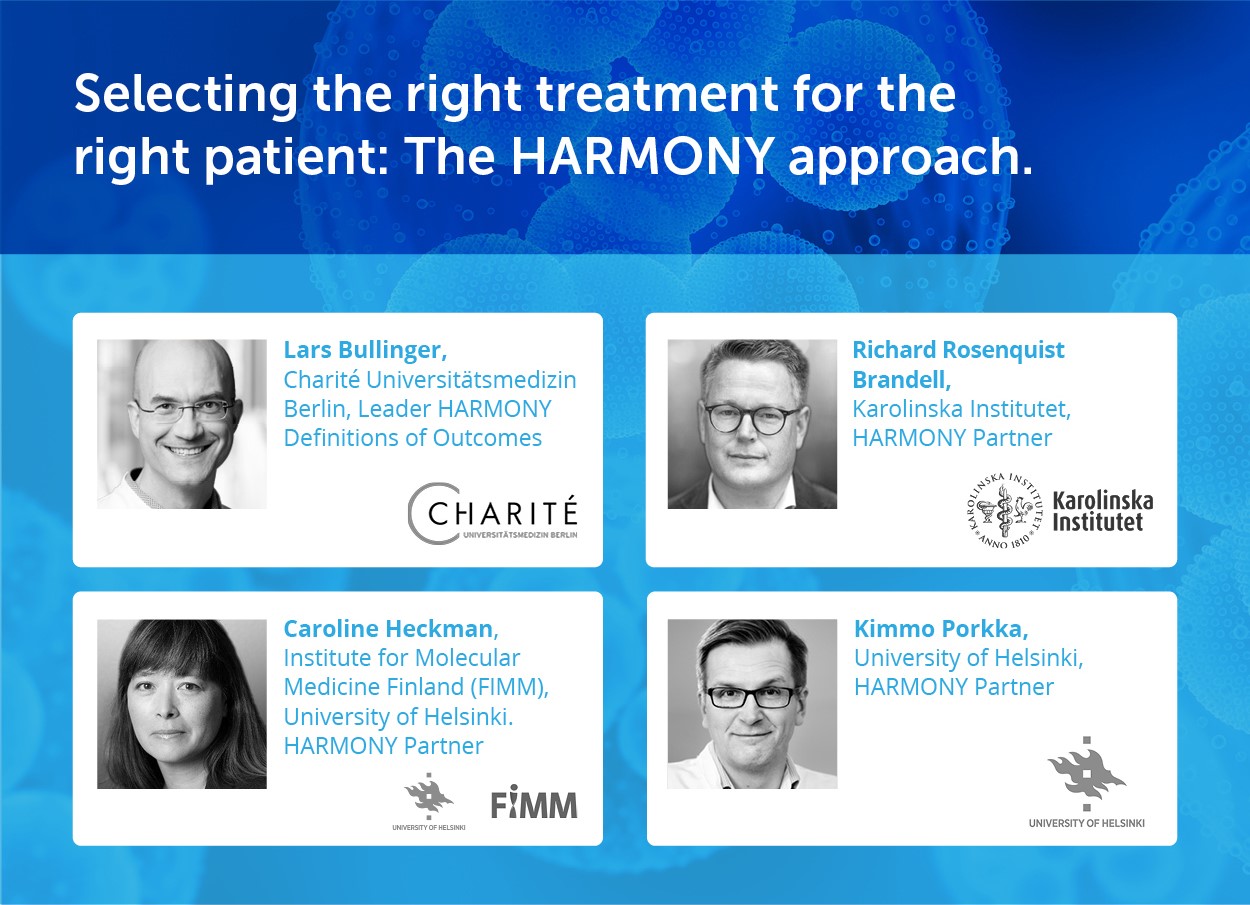
Professor Richard Rosenquist Brandell is on the organizing committee of the symposium. He is a Professor of Clinical Genetics at Karolinska Institutet and director of Genomic Medicine Sweden. “In hematology, we have been working with precision diagnostics and precision medicine for a long time already. We have been using genetic diagnostics to stratify patients in order to select the right treatment for the right patient. In addition, Hematologic Malignancies were among the first diseases where targeted therapies were implemented. In this symposium, we wanted to highlight precision medicine in Hematologic Malignancies, both myeloid and lymphoid malignancies".
"We have gathered excellent scientists and clinicians who have contributed to the understanding of the complex nature of these diseases. They will give examples of successful implementations of precision diagnostics and targeted therapies, and they will discuss what we can expect in the future,” says Rosenquist Brandell.
Acute Myeloid Leukemia (AML)
One of these excellent scientists and clinicians is Professor Lars Bullinger. He is Director of the Medical Department of Hematology, Oncology, and Tumorimmunology of the Charité Universitätsmedizin Berlin. Bullinger is an expert in Acute Myeloid Leukemia (AML). He explains how HARMONY’s Research Projects in AML will facilitate precision medicine in hematology: “The large numbers of anonymized data sets that we have gathered in the HARMONY Big Data Platform allow us to define clinically relevant leukemia subgroups. In our first research efforts in AML, we identified genomic aberrations and gene-gene interactions that allow us to more precisely distinguish subgroups of patients.These may for example be patients that will likely benefit from a stem cell transplantation, patients that can safely postpone transplantation, and patients that are likely to respond poorly to both conventional chemotherapy and transplantation. In the latter group, we should try to identify open trials with innovative novel drugs".
"I would be convinced as a patient that I should try that option, knowing that the standard treatment will likely fail. You only have one shot to get the treatment right in these high-risk patients. HARMONY will help us to better identify them upfront,” says Bullinger.
HARMONY research projects in AML
Chronic Lymphocytic Leukemia (CLL)
Rosenquist Brandell is involved in a CLL research project within HARMONY. It aims to assess the prognostic and clinical relevance of 10 of the most frequently mutated genes in CLL.
Rosenquist Brandell: “The clinical course of CLL is highly variable. Around 80% of patients are asymptomatic at the time of diagnosis. Some patients will never require treatment whereas others will develop a treatment need over time. So, a ‘wait and watch’ approach is usually applied in CLL. We know that the disease is highly heterogeneous from a genomic perspective as well. More than 2.000 genes have been found to be involved in CLL, and mutations in these genes are usually found in less than five percent of patients. This means that you need to study thousands of patients to get robust insight into the role of these gene mutations in the course of the disease.
"In this HARMONY research project, we have asked centers across Europe to sequence 10 genes in their patients with CLL. These are the ten mostly commonly mutated genes in CLL. There has been fantastic interest: the cohort now consists of more than 4,600 patients. We have already looked at the frequency of the different mutations and investigated if we can discern a pattern. We obtained some interesting results, seeing that certain mutations seem to be almost mutually exclusive".
"The next question is: ‘Which of these genes is clinically most relevant?’ We want to know which genes are associated with poor outcomes. This knowledge may allow clinicians to give patients a more reliable estimate of what they can expect in terms of the clinical course of the disease. In addition, it may affect treatment choices. We are now studying only 10 genes, but there are many other genes and aspects that we could study with the HARMONY data in the future,” explains Rosenquist Brandell.
HARMONY research projects in CLL
Big Data Analytics
The stories of Bullinger and Rosenquist Brandell illustrate how the large cohorts that have been assembled in the HARMONY Big Data Platform allow research teams to gather knowledge that will help to personalize diagnostics and treatment of HMs. These research projects involve large amounts of data, calling for highly sophisticated Big Data analytic methods. This is the realm of Professor Kimmo Porkka, Head Hematology Division/HUCH of the University of Helsinki and of Professor Caroline Heckman, Research Director at the Institute for Molecular Medicine Finland (FIMM) of the University of Helsinki.
“In the past four years, the HARMONY Alliance has developed a unique Big Data Platform. HARMONY teams have identified more than 80,000 anonymized data sets of patients with HMs, and we have also developed state-of-the art Big Data analytics solutions to mine these data. Data analysis becomes more challenging now that the data is larger and more complex. We need tools like artificial intelligence, machine learning and computational models to better understand and interpret the data,” says Heckman.
The HARMONY Big Data Platform
A look into the future
Heckman: "The HARMONY Big Data Platform and the associated data analytics services will be an important tool in the future and the basis for a lot of research. Not only for translational research, but also for clinical studies. I think one important aspect of HARMONY is that it will enable researchers in both industry and academia to utilize data to develop what we call ‘common control arm cohorts' of patients and avoid having to include a placebo arm in their clinical studies. The data from HARMONY would be sufficient in those clinical studies, so basically, all patients enrolled in future clinical studies could then be given the experimental treatment and could avoid being allocated to a placebo arm. So, I think that is going to be a huge benefit. My hope is that in the future, data from new technologies such as single cell sequencing can also be included in the HARMONY platform.”
Bullinger: “In HARMONY PLUS, launched in October 2020, we will cover the full range of hematologic malignancies, including acute leukemias, chronic leukemias, lymphomas and monoclonal gammopathies. This is an important asset. In addition, we are working hard to get more real-world data into the Big Data Platform, as well as more data sets from patients that have been treated with new targeted drugs".
“I am looking forward to the future of the HARMONY Alliance (HARMONY and HARMONY PLUS). It has of course been a big effort to get it off the ground and now people are starting to make use of it. Researchers both in industry and academia can really utilize it to its fullest potential,” concludes Porkka.

HARMONY Partner EHA, the European Hematology Association, recently published a Position Paper on the topic of Personalized Treatment for Hematologic Diseases in Europe, providing a status quo analysis and solutions for the near future which reflect the common thoughts of healthcare professionals and patients actively engaged in developing this topic. Open the paper >
HARMONY (since 2017) and HARMONY PLUS (since 2020) have received funding from the Innovative Medicines Initiative 2 Joint Undertaking, under grant agreement No. 116026 for HARMONY and grant agreement No. 945406 for HARMONY PLUS. This Joint Undertaking receives support from the European Union’s Horizon 2020 Research and Innovation Programme and the European Federation of Pharmaceutical Industries and Associations (EFPIA).

Become involved! Connect with us and find out what we can offer you >
Receive the latest news. Click here to subscribe!